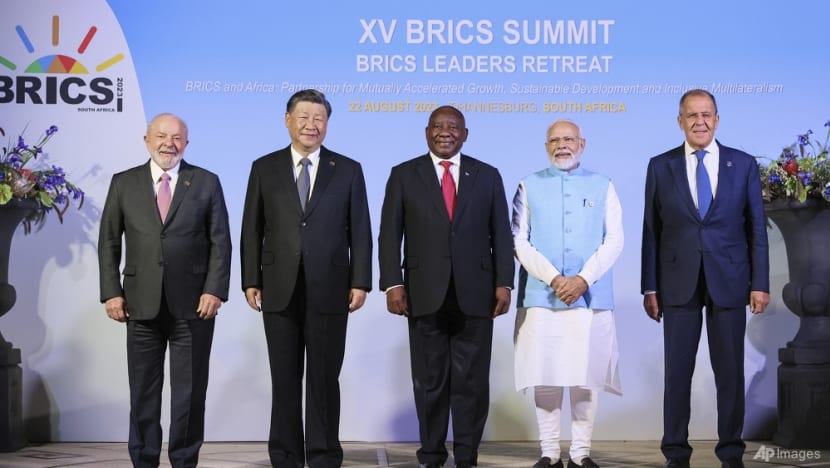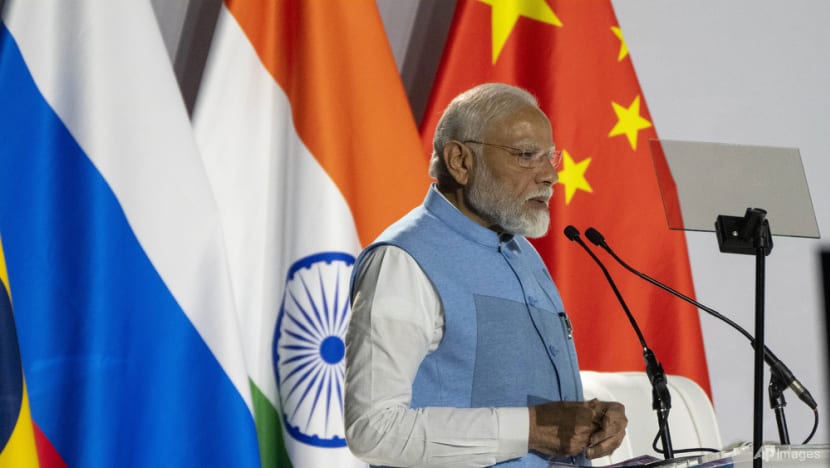BRICS members, especially India and China, have to work closely in order to challenge West's dominance: Veteran economist
More than 20 countries have formally applied to join the bloc, which operates by consensus, but the proposed expansion has caused division among its existing members.

In this photo released by the Russian Foreign Ministry Press Service, Brazilian President Luiz Inacio Lula da Silva, Chinese President Xi Jinping, South African President Cyril Ramaphosa, Indian Prime Minister Narendra Modi and Russian Foreign Minister Sergey Lavrov pose for a photo on the sideline of the BRICS group of emerging economies three-day summit in Johannesburg, South Africa, Tuesday, Aug. 22, 2023. (Russian Foreign Ministry Press Service via AP)
BRICS members, especially Asian superpowers India and China, have to work even closer in order to challenge a world order dominated by the West, said veteran British economist Jim O’Neill.
BRICS leaders are meeting in South Africa this week to plot the future of the bloc and consider expanding the group that accounts for a quarter of global wealth.
“If China and India have a deliberate policy to grow their trade significantly together, it would be so big it would literally transform world trade,” said Mr O’Neill, who coined the BRICS acronym for the fast-growing economies of Brazil, Russia, India, China and South Africa.
He said on Tuesday (Aug 22) that the rest of the world would pay more attention to the bloc and its members, and “give them a lot more power and influence”, if this is achieved.
“But just by meeting once a year and saying all these grandiose things including trying to have a new BRICS currency, these things aren't really going to achieve much other than to make them feel good at the time of when they say those comments.”
OPERATING BY CONSENSUS
The five BRICS members represent more than 40 per cent of the world's population.
“I think it is clear that each of the members really values the symbolic importance of the BRICS,” Mr O’Neill told CNA’s Asia Now.
“If it weren't for India and China, the two giants, I'm not sure what the BRICS would really represent. And because of those two the aggregate size of the group is huge, but without those two, it wouldn't be much at all.”
Meanwhile, Brazil and Russia, despite considerable problems, are still in the top world economies.
“Brazil at one point had become the sixth largest but it's gone back a bit lower. But of course, it's still easily, by some distance, the most important economy in Latin America,” said Mr O'Neill.
“And Russia is this giant, ginormous, complicated country as we see right now from a very unsavoury perspective, sitting on the edge of Europe and Asia.”
BRICS EXPANSION ON THE AGENDA
However, India has increasingly been courted by the West.

Indian Prime Minister Narendra Modi, for instance, made a trip to the United States in June – his first with the full diplomatic status of an official state visit. Before that, Mr Modi made five previous visits to the US since becoming prime minister in 2014.
The UK too, is frequently trying to establish greater ties with India, said Mr O’Neill, the former chairman of Goldman Sachs Asset Management and a former UK Treasury Minister.
“At the heart of the challenges the BRICS face in being effective is again, when you really look at it realistically, India and China rarely agree on anything,” he added.
“If the BRICS really wanted to achieve things, China and India have got to somehow be a lot more serious about trying to do things together.”
Related:
More than 20 countries have formally applied to join BRICS, which operates by consensus, but the proposed expansion has caused division among its existing members.
They see the bloc as an alternative to global bodies dominated by traditional Western powers and hope membership will bring benefits such as increased trade and investment.
BRICS members need to work together to raise its influence inside the G20 and other global governance bodies, urged Mr O’Neill.
“It would all be really good for the world economy and world society in my opinion,” he added.
“But just trying to expand to other countries for the sake of symbolically having a rival to the West, it doesn't really serve much purpose beyond this enormous symbolism in my view.”














